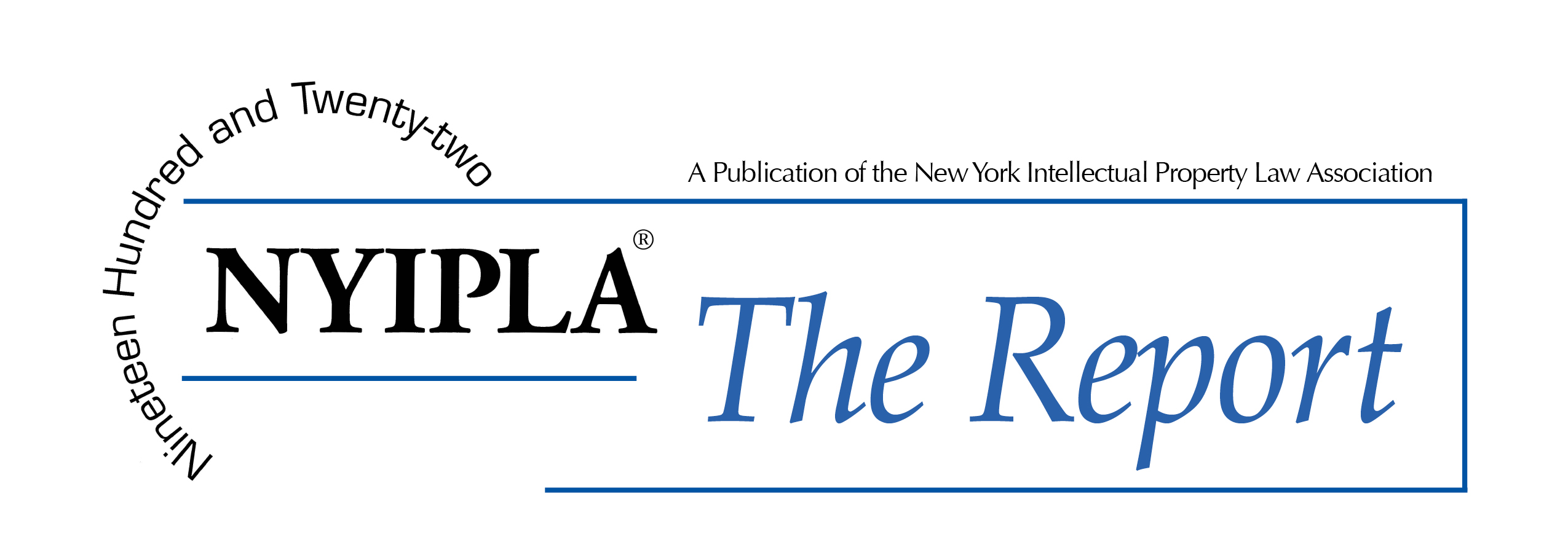|
 Summer/Fall 2025 Summer/Fall 2025
|
NYIPLA The Report
|
|
NYIPLA President's Corner
By: Abigail Struthers
I am honored and privileged to be writing you a note from the “President’s Corner” as I lead the NYIPLA into its 104th year. And what a year it has been so far. But times like these—when we are seeing rapid changes in the legal and policy landscape—shine a light on the tremendous value of our organization: a community of professionals who not only represent diverse interests and viewpoints, but who are also united in the common goal of supporting and improving the practice of intellectual property law. Read More>>
|
|
PTAB is more Aggressively Reversing § 101 Rejections Under the Trump Administration
By: Charles R. Macedo, Partner, Thomas Hart, Associate, Lewis Derenzis III, & Joshua Jacobson, Law Clerks, Amster, Rothstein & Ebenstein, LLP
Since the arrival of the Trump administration and former Acting Director Coke Morgan Stewart at the U.S. Patent Trial and Appeal Board (“PTAB”), the PTAB has changed its approach in ex parte appeals with respect to reviewing patent-eligibility rejections under 35 U.S.C. § 101. Read More>>
|
When Licensing Meets Trade Dress: The Big League Chew Shredded Chewing Gum Case Through the Eyes of a Licensor
By: Giselle Ayala1
Licensing is a powerful commercial tool that allows intellectual property (“IP”) owners to expand their market reach without surrendering their IP ownership rights.2 Through a well-drafted license agreement, a brand owner can leverage another company’s manufacturing, distribution, or marketing infrastructure to reach new consumers while maintaining control over the quality and presentation of the product.3 This structure also creates an efficient way to monetize intangible assets: instead of incurring production or marketing expenses, the licensor earns royalties based on the licensee’s sales, generating a steady revenue stream while keeping its intellectual property portfolio intact.4 For licensees, the arrangement provides access to an established brand identity, saving years of investment in developing consumer recognition.5 Read More>> |
|
“Blanding Out”: Exploring the Complexities of the “Blanding” Minimalist Design Trend and What It Means for Your Client’s Trademark Rights
By: Mike A. Ortega1
A logo is more than just an intangible corporate asset, it is one of the most prominent forms of direct and indirect communication vehicles that a brand has in its arsenal.2 With about 75% of consumers being able to recognize a brand by its logo, a corporate logo is vital to establishing instant recognition of your brand by consumers.3 By improving logo familiarity, brands see improvements in conversion rates by 42% on average.4 For these reasons, establishing a strong and distinctive logo that consumers can easily recognize should be a top priority for any brand. Read More>>
|
|
When AI Writes Your Claims: A New Frontier for Prosecution-History Estoppel
By: Sarah Lim, New York Law School, JD Candidate
Generative AI tools are reshaping patent practice. A 2024 survey of IP professionals found that while 43% are not currently using AI in their practice, those who have adopted AI tools report significant efficiency gains and improved accuracy as the most significant benefits. Early adopters report 50-70% reductions in claim-chart-generation time and faster docket clearance. USPTO Director Vidal acknowledged in her 2024 guidance that AI tools now possess the ability to draft technical specifications, generate responses to Office actions, and even draft patent claims with minimal human input.Read More>>
|
Notable Trademark Decisions, October 2025
By: Scott Greenberg and Vrudhi Raimugia
Federal Circuit Vacates And Remands TTAB’s Holding That Confusion Is Likely; Board Did Not Sufficiently Consider The Evidence Of Third Party Use Of Similar Marks
In a precedential decision, the United States Court of Appeals for the Federal Circuit (“CAFC”, or the “Court”) vacated and remanded the holding of the USPTO’s Trademark Trial And Appeal Board (the “Board”) that confusion was likely between Applicant Apex Bank’s mark ASPIRE BANK for “banking and financing services” and Opposer CC Serve Corporation’s previously registered mark ASPIRE for credit card services. The CAFC panel found that, in view of the Board’s correct finding that the parties’ services were related, the Board failed to sufficiently consider the evidence of similar third-party marks being used in connection with equally related services. Apex Bank v. CC Serve Corp., __ F.4th __, 2025 USPQ2d 1224, 2025 U.S. App. LEXIS 24802 (Fed. Cir. Sept. 25, 2025). Read More>> |
|
“As Time Goes By – And So It Goes”
By: Dale Carlson
It’s hard to imagine that 2025 marks twenty years of my serving as NYIPLA historian. The two decades have passed in a flash. Read More>>
|
|
NYIPLA Spotlight
Q&A with Jennifer Rea Deneault
Read More>>
|
Welcome New Members!
and Moving Up & Moving On
Read More>>
|
|
NYIPLA Publication Committee Editorial Team
Committee Co-Chairs Giselle Ayala-Mateus, Richard Kurz, and Kathryn Bi
Board Liaison Jennifer Deneault
|
|

